Replace your system with
0%
Financing Options
Schedule Your Emergency Repair
YOUR COMFORT IS ONLY MINUTES AWAY!
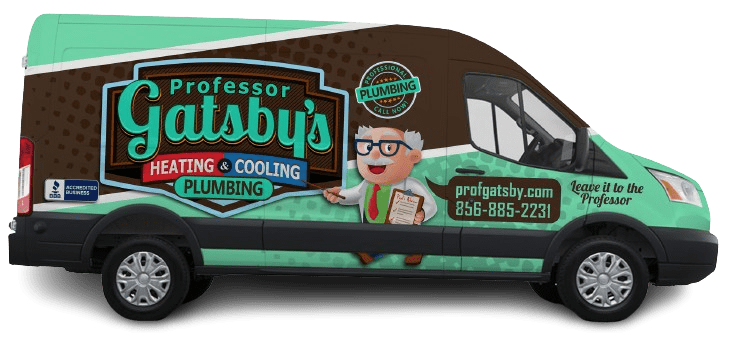

Heating, Air Conditioning & Plumbing Repair, Maintenance, and Installation in
South Jersey & Mercer County



Proudly Serving These
South Jersey Areas and Mercer,
Proudly Serving These
South Jersey Areas,



Why Hire Us for Your Heating and AC Needs
When your heating or air conditioning system malfunctions, you want things fixed as quickly as possible, right? As a result, the Professor’s fleet visits homes and families throughout South Jersey and Mercer County. Our experienced technicians arrive with fully stocked vehicles to get you back up and running quickly.
Yes, we are quick, but our pros are keen on details. They’ll go through everything with you to ensure you know what went wrong, why it happened and give you the best advice to repair. Customers tell us that they have never been treated more professionally and sensibly by a company. Only Professor Gatsby’s Heating and Cooling will give you that feeling of assurance and care. We are proud to stand behind our work with a 100% satisfaction guarantee!
Professor Gatsby’s expertise in both residential and commercial HVAC repair, installation, replacement and other HVAC maintenance systems, we provide reliable and efficient repair solutions to keep your business running smoothly. We expertise in both residential and commercial HVAC repair, we provide reliable and efficient repair solutions to keep your business running smoothly. Our HVAC services are straightforward. If it’s broken, we can fix it. If it’s working, we can maintain it. If it’s obsolete, we can replace it. And as for our work, we guarantee it.
Although there may be many options, how we handle our customers sets us apart from the competition. We place a high value on the satisfaction of our clients, as seen by our 5-STAR RATINGS. For every HVAC South Jersey service we provide, we only employ the best and most experienced professionals, delighting our clients.
Our Specials
Heating
All kinds of heating systems must be carefully selected and installed only by well-experienced professionals. Experts can recommend reliable brands and install the units according to industry standards. Letting professionals do the technical work will ensure the proper functioning of the entire heating system.
A/C
Everyone desires a cozy living space, especially when they are at home and want to unwind. Thanks to modern technology, it is now simpler than ever to maintain a suitable indoor temperature, regardless of the outside weather.
Plumbing
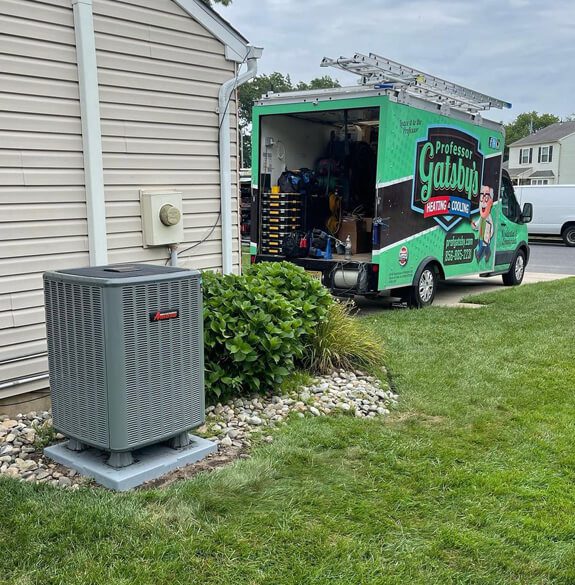

The Professor Does It All!



The Professor Does It All!



What People Say About Us
Fixed incorrect humidifier wiring under warranty as agreed. Thanks!
24/7 Emergency Service Available
Get in Touch
Latest Blogs
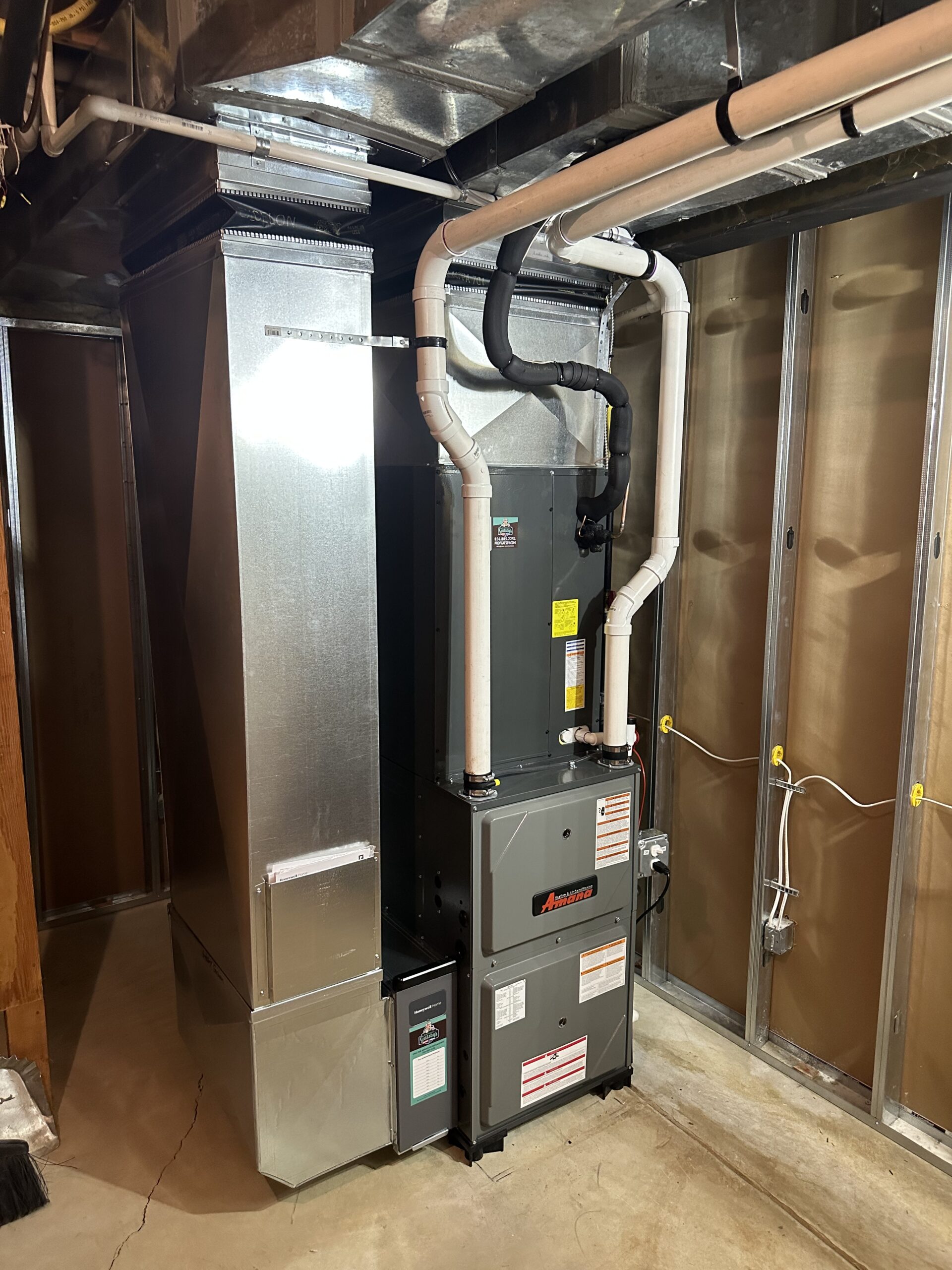

How Much Does It Cost To Replace A Gas Furnace?
Your furnace becomes the most crucial component of your home when the weather turns frigid. You need a working heating system to keep your house warm during the winter. But if your old furnace fails and repairs are pricey or frequent, you might consider a new furnace. Don’t freak out. The right service company can help. We will discuss the typical costs of replacing a gas furnace to help you estimate your potential expenses. We’ll also show you a few indicators that you might need a new furnace, so read on. How Much Does It Cost To Replace A Gas Furnace? A gas furnace transforms energy into heat, which spreads throughout your house as warm air. Although there are many different fuel options for furnaces, gas furnaces are the most common option for households. Why? They provide warmth and comfort for homes without raising monthly energy expenses. Gas furnaces are also affordable to install and don’t require much upkeep. The price to replace a gas furnace may vary greatly depending on the type of furnace you choose and how challenging the installation process is. Replacing your gas furnace with a new one can cost you between $2,000 and $7,000. However, some high-efficiency models can go as high as $12,000 today. What factors affect the final price? Three key aspects go into calculating the cost of replacing your furnace. Type of Gas Furnace The cost of a gas furnace varies depending on its efficiency and features. Although they cost more upfront, more efficient furnaces can save you money on your gas bill. Even though it is more expensive than a single-stage model, a two-stage furnace may be more reliable and efficient in maintaining warm temperatures. Furnace Parts Your HVAC specialist will use compatible parts and supplies to install your new furnace inside your current heating system. Usually, your installation expenses will cover the cost of these materials. Labor Expect a qualified specialist to spend several hours working on your installation. For complicated or labor-intensive installations, these labor expenses could easily reach $1,500 or more. Common Furnace Issues Although old age is a significant contributing factor, there are other causes of furnace failure. The following are some of the primary reasons for furnace breakdowns: Dirty filters Age Heat exchanger with cracks Blower motor malfunction It’s time to think about a replacement when a gas furnace is old enough to drive. The typical lifespan of a furnace is between 16 and 20 years. However, some homeowners choose to replace it sooner to increase their home’s efficiency. But for experts, modern furnaces are frequently more effective. How to Find the Best Gas Furnace? Fortunately, determining how much a new gas furnace will cost is simple. The type of furnace determines the cost of installation. It’s crucial to pick a furnace that fits the size of your house. If the gas furnace is too small, your home won’t be able to be heated efficiently. On the other hand, if it is too large, it will waste energy, causing a high electricity bill. It all comes down to working with a reputable service provider to ensure the furnace is suitable for your home and needs. It will assure you that the work is worthwhile and give you peace of mind this chilly winter. Choose Professor Gatsby Heating and Cooling, a provider of heating & cooling comfort in Southern New Jersey. Replacement gas furnaces can cost anywhere between $2,000 and $7,000. Work with professionals with extensive installation expertise and strike the perfect balance between cost and efficiency. Contact Professor Gatsby Heating and Cooling for a furnace installation that satisfies your comfort needs. Call our staff today and ask for a free estimate! You can reach us by phone at (856) 885-2231 or at https://www.profgatsby.com/.
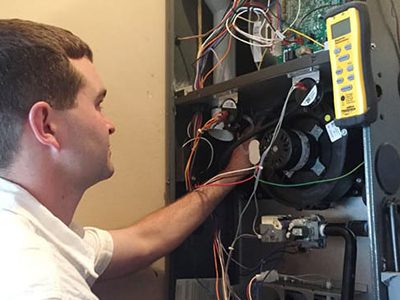

The Top 5 Causes of Furnace Failure and Potential Need for Furnace Repair Services
A furnace is an essential appliance in a home, particularly during the winter. It provides warmth and comfort when temperatures outside are at their coldest. Imagine the stress of returning home to a chilly house only to find that your furnace has broken down, necessitating the need to call a furnace repair service. If this happens to you, don’t panic! Below are five common reasons why furnaces stop working and how you can fix them. Thermostat Issues A thermostat issue is one of the most prevalent causes of furnace failure. There are a variety of causes of thermostat malfunctions, including old age, weak wiring, and low battery power. Try changing the batteries if you think the thermostat is the issue. If it doesn’t work, a new thermostat may be required. If you don’t feel confident handling the job, call a heating technician from a trusted furnace repair service for a more thorough diagnosis. Pilot Light Issues Your furnace may not be working if the pilot light used to ignite the burner has gone out. The furnace won’t produce heat if the pilot light is out. You can inspect the pilot light through the access panel on the side of the furnace. You can attempt to manually relight the pilot light if it goes out by carefully following the directions in your user’s manual. Contact a licensed HVAC specialist to do it for you if you don’t feel comfortable handling it yourself. Clogged Air Vents Clogged air vents are another typical issue that can stop a furnace from functioning. Blocked air vents can result in decreased efficiency and reduced airflow. Turn off and restart your furnace after clearing debris from the air vents. After the dust and dirt are gone, clean the area using a brush or a vacuum with a hose attachment. Once you’ve finished cleaning the vents, switch on your furnace to ensure it’s properly operating. Gas Leakage It is among the dangerous reasons for furnace malfunctions. If you smell gas when turning on your furnace, there may be a leak, and you should immediately leave the area. Don’t try to re-light the pilot light because that might start a fire or cause an explosion. Avoid attempting to tackle the problem on your own. Once you are safely outside the house, call your gas company so they can send someone out to fix the leak. Faulty Blower Motor If your furnace includes a blower motor, that could be the root of the problem. The furnace’s blower motor pumps air around your home. Its damage or failure could result in less efficient operation and reduced airflow. To check for damage, open the access panel on your furnace and look directly at the blower motor. Get a new one if there is any damage, such as cracks or missing pieces. Since it requires specialized equipment and training, you should hire a licensed furnace repair service specialist to handle this for you. Conclusion While furnaces can last, something will eventually go wrong, which could mean repair or replacement. Knowing some of the most common causes of furnace failure might help you avoid wasting time and money when your furnace ultimately decides to quit. When all else fails, what? As a last resort, you should always call a licensed heating technician! Call Professor Gatsby’s Heating and Cooling at 856-885-2231 for more details on how we can help with your furnace and heater repairs and maintenance. We offer skilled and reasonably priced furnace repair services. You can contact us by using our online form, and we’ll get back to you immediately.
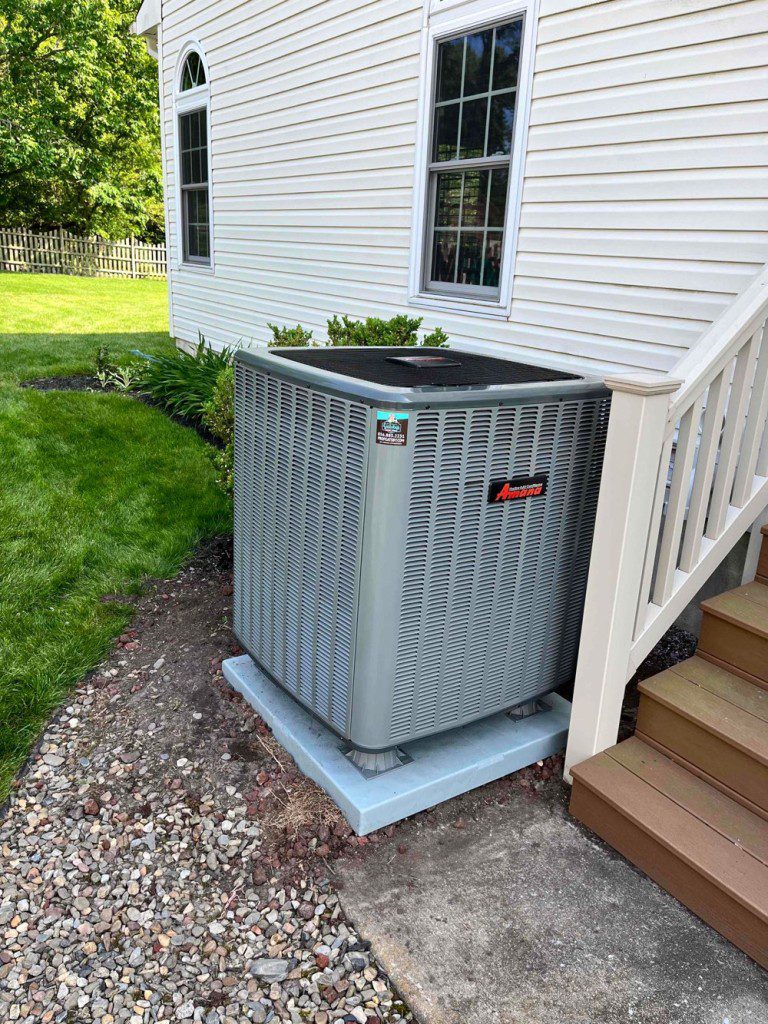

Preparing Your HVAC System for the Changing Seasons: Summer to Fall Transition
As summer gradually gives way to fall, it’s time to shift your focus from keeping cool to staying warm and comfortable indoors. Properly transitioning your HVAC system from cooling mode to heating mode is essential for ensuring a seamless shift in seasonal comfort. In this blog post, we’ll delve into the importance of this transition, provide step-by-step instructions for homeowners, and highlight the benefits of proactive HVAC maintenance as the weather cools down. The Importance of Transitioning Your HVAC System: Transitioning your HVAC system from summer to fall mode is more than just flipping a switch—it’s about optimizing your system’s performance for the changing weather conditions. Neglecting this transition can lead to inefficiencies, discomfort, and even potential system issues. By proactively preparing your HVAC system for fall, you’ll enjoy a smooth transition and uninterrupted indoor comfort. Step-by-Step Instructions for a Seamless Transition: Adjust the Thermostat Settings: Gradually raise the thermostat temperature from cooling mode to heating mode. Consider installing a programmable thermostat to automate temperature adjustments based on your daily schedule. Replace Air Filters: Change or clean air filters to ensure proper airflow and prevent dust and debris from entering the system. Clean filters improve indoor air quality and contribute to efficient system operation. Inspect and Clean Vents and Ducts: Check vents and ducts for blockages, debris, or dust buildup that may have accumulated during the summer months. Ensure proper airflow and distribution of heated air throughout your home. Schedule Professional System Inspection: Arrange for a professional HVAC inspection and maintenance service. Technicians will perform a thorough system check, including inspecting electrical components, cleaning coils, and ensuring proper system operation. Benefits of Proactive Maintenance: Improved Energy Efficiency: Proactively maintaining your HVAC system helps ensure that it operates at peak efficiency. A well-maintained system consumes less energy, resulting in lower utility bills during the fall and winter months. Enhanced Comfort: A properly tuned HVAC system provides consistent and even heating throughout your home, ensuring your comfort during colder days. Prevention of Costly Repairs: Regular maintenance helps identify and address potential issues before they escalate into major problems. Timely repairs prevent unexpected breakdowns and the need for costly emergency repairs. Extended System Lifespan: Proper care and maintenance extend the lifespan of your HVAC system, saving you money in the long run. Transitioning your HVAC system from summer to fall is a proactive step that pays off in comfort, energy savings, and system longevity. By following these step-by-step instructions and scheduling professional maintenance, you’ll ensure that your HVAC system is ready to provide efficient and reliable heating throughout the upcoming fall season. Don’t overlook the importance of this transition—take the necessary steps to prepare your HVAC system for the changing seasons and enjoy a cozy and comfortable indoor environment.
MAINTENANCE
Lorem ipsum dolor sit amet, consectetur adipiscing elit. Ut elit tellus, luctus nec ullamcorper mattis, pulvinar dapibus leo.





